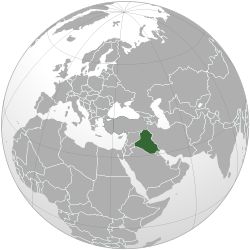Buoyed In Syria, Al-Qaeda Turns To Iraq? – OpEd
By VOR
By Dmitry Babich
Whatever the government of Bashar al-Assad says, its words can be used against it. This is the lesson to be drawn from the reaction of Barack Obama and other Western leaders to a statement of the Syrian authorities promising not to use Syria’s chemical weapons against Syrian citizens.
Obama interpreted these words as a threat to Western civilization, warning Assad of dire consequences if he tried to use poisonous gas against foreigners.

This exchange of statements reminds an unbiased observer of a dialogue of two deaf persons. (How can one discern a threat to the United States in a statement that “any stock of W.M.D. or unconventional weapons that the Syrian Army possesses will never, never be used against the Syrian people or civilians” made by the Syrian spokesman Jihad al-Makdisi?) It could be included in some comic book of the world’s most absurd communication failures, if it had not been for the tragic situation with the uncontrolled spread of weapons and violence on the ground, not only in Syria, but also in neighboring Iraq and Lebanon – in short, all over the “greater Middle East” which the United States promises to make prosperous and democratic since the early 2000s. For the moment, not this radiant perspective, but rather a series of sectarian conflicts in the region seems likely. The death of 110 persons in one day of bombings in Iraq is viewed by many analysts as an indicator of the renewed activity of al-Qaeda, buoyed by the success of its fellow Sunni insurgents in Syria.
“Lots of forces have their interests in Iraq, which has only recently started to recover from the pangs of the civil war,” explains Artyom Kapshchuk, the chief political analyst on Arab world at Moscow-based Rusiya al-Yaum television station. “Both Saudi Arabia and Iran have their stakes in Iraq. Obviously, the possible crumbling of Assad’s regime in Syria, seen as pro-Iranian, may inspire the Sunni Al-Qaeda and its foreign sponsors to start a new wave of terror in Iraq. The Western claims that the removal of Assad will make the region more stable is a dangerous delusion. Serious analysts do not believe these claims, as well as assertions that fighting in Syria is about democracy.”
The most absurd part of the situation is that as the European Union recently toughened the prohibition on shipment of arms to the Syrian government, imposing the so called seventeenth package of sanctions on Damascus, the United States makes little secret of its supplying the Syrian rebels with “ defensive” arms and communication equipment. Obviously, the Sunni rebels do not lack arms of attack neither, as this niche is gladly filled by the Sunni-ruled Saudi Arabia and Qatar. Part of this attack capability obviously finds its way to Iraq too, as the recent wave of bombings indicates.
The French daily Le Figaro quotes an Iraqi government official as saying that the bombing attacks in Iraq that killed 110 people on Monday could be aimed at liberating al-Qaeda’s members kept in Iraq’s prisons. The paper suggests that al-Qaeda’s local leader Abu Bakr al-Baghdadi could need these people for al-Qaeda’s operations against Assad in Syria and possibly against the Iraqi government too. “The Syrian border has always been the point where the insurgents entered our territory,” the official is quoted as saying. “There is no doubt that these people plan to seed chaos in Iraq, just like they are doing it in Syria.”
Chaos, not democracy – this is the truth about the aims of the Syrian rebels which slowly but steadily makes its way to the Western press. For the moment, the true picture of the war in the mainstream press is made visible only via facts and quotes of the rebels themselves. But these quotes and images speak louder than heavily choreographed editorial comments, which put all the blame on Assad and make Russia guilty by association. The same daily Le Figaro recently put on the web excerpts from a video, produced by Syrian rebels, where the movement’s new recruits are taught not only to use Kalashnikovs and M16s, but also to set homes on fire by homemade devices. The reaction of the French readers was natural for peaceful persons and obviously did not fit the framework of this newspaper’s editorial comments.
“If this is “peaceful” resistance, then what the armed one will look like?! Obviously, the consequences of supporting Islamists against the Soviet Union in Afghanistan did not teach the Western countries anything,” commented a reader who identified himself as Darius47.
The other menacing development is the apparent lack of settlement in sight. The West and its anti-Assad coalition of the local royal dictatorships, with Saudi Arabia and Qatar in the first place, obviously have no coherent plan for the post-Assad settlement. There are clear disagreements between the United States, their European allies and the Gulf monarchies on the role of the military (both the loyalists and the opposition fighters), the destiny of the Alawite minority and the division of the country’s riches between various groups of interest. Obviously, the “spring” in Syria develops according to its own logic, it is far from fitting anyone’s plans or expectations, except al-Qaeda’s.
